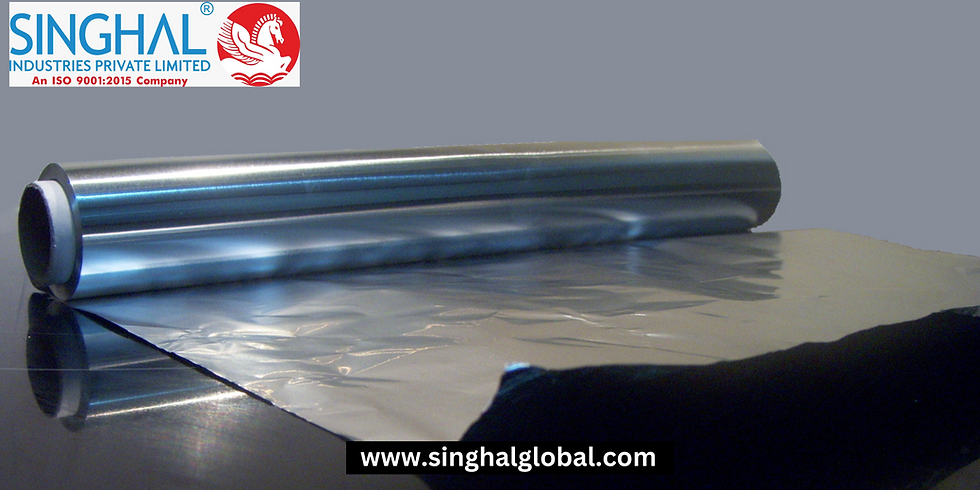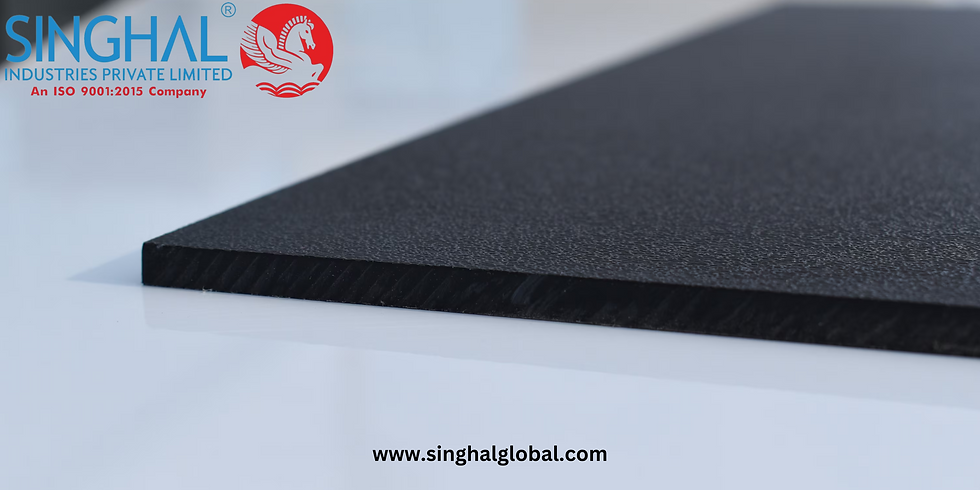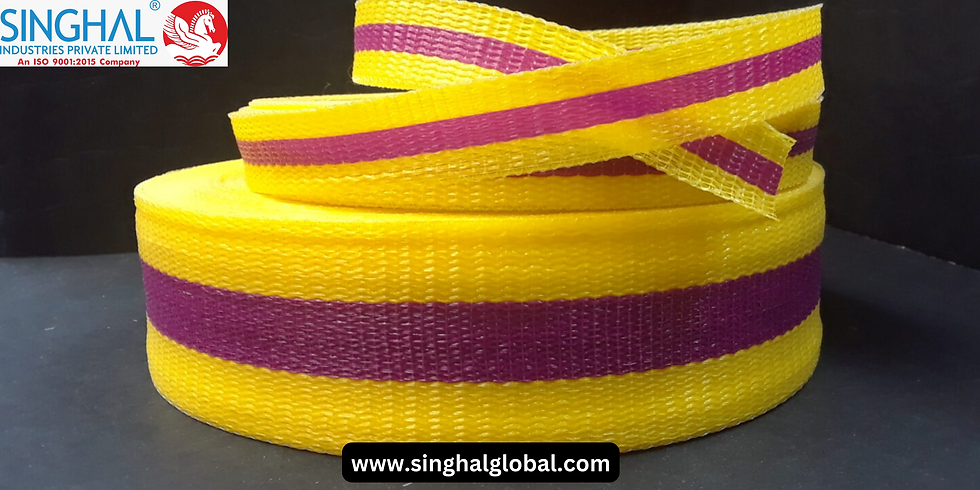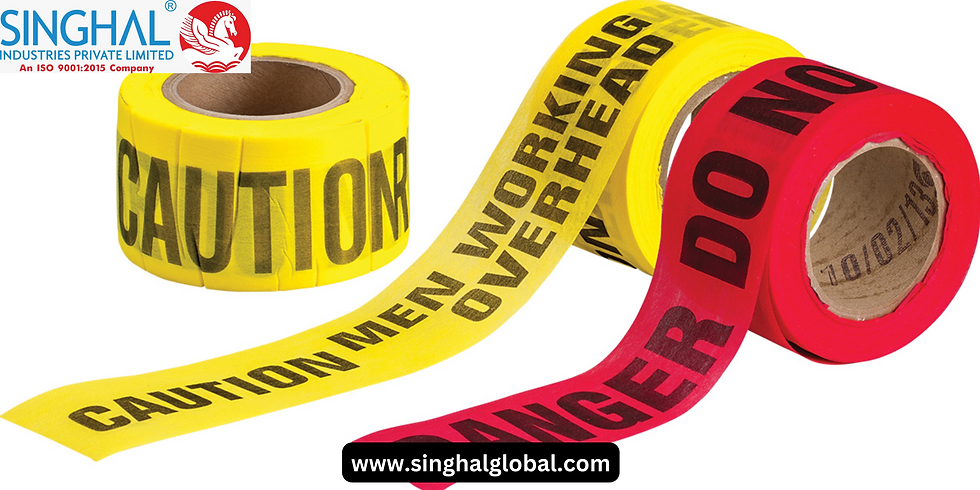Why Aluminum Foil Sheets Are Essential in Packaging and Other Industries
- Singhal Industries Private Limited
- Nov 16, 2024
- 6 min read
Aluminum foil sheets are thin, flexible sheets of aluminum that are used in a variety of applications across different industries. Aluminum sheet supplier lightweight, durable nature, along with excellent resistance to corrosion, makes them highly versatile and essential in sectors such as packaging, pharmaceuticals, and food processing.
Relevance and Uses of Aluminum Sheets
Aluminum sheets, particularly foil sheets, are an integral part of modern life. Whether it's packaging your food, insulating your home, or aiding in aerospace engineering, aluminum sheets are everywhere. This article explores the uses, benefits, and applications of aluminum foil sheets and highlights the role of aluminum sheet suppliers and exporters, focusing on the global market.
Purpose of the Article
In this article, we'll dive into the key aspects of aluminum foil sheets, the various types available, and their real-world applications. We will also discuss the global trade of aluminum sheets, with a special focus on aluminum sheet suppliers and exporters, and how these play a crucial role in meeting global demand.
Understanding Aluminum Foil Sheets
Composition of Aluminum Sheets
Aluminum foil sheets are primarily composed of pure aluminum, a lightweight and malleable metal. They can range in thickness from 0.0005 inches to several millimeters. These sheets are made by rolling aluminum ingots, which are then processed into thin, flexible sheets suitable for various uses.
Types of Aluminum Sheets
There are different types of aluminum sheets based on thickness, treatment, and surface finish. Some common types include:
Rolled Aluminum Sheets: Thin sheets obtained by rolling aluminum ingots into long, flat sheets.
Foil Sheets: Ultra-thin aluminum sheets, often used for food packaging.
Anodized Aluminum Sheets: These sheets have a special surface coating for added durability and corrosion resistance.
Key Properties of Aluminum Sheets
Some notable properties of aluminum sheets include:
Lightweight: Aluminum sheets are about one-third the weight of steel, making them ideal for applications requiring strength without adding excessive weight.
Corrosion Resistance: Aluminum has a natural oxide layer that prevents rusting, ensuring longevity and durability.
Conductivity: Aluminum is an excellent conductor of heat and electricity, making it suitable for industrial applications.
Manufacturing Process of Aluminum Sheets
How Aluminum Sheets Are Made
Aluminum sheets are created through a process called hot rolling, where aluminum ingots are heated and then passed through rollers to form thin sheets. The sheets can undergo further treatments, such as cold rolling, anodizing, or coating, depending on the desired end-use.
Key Technologies Used in the Process
The production of aluminum sheets involves advanced machinery and technologies. Some key technologies include:
Continuous Casting: This process helps produce large, uniform aluminum slabs, which are then rolled into sheets.
Cold Rolling: Involves reducing the thickness of aluminum sheets at room temperature to achieve the desired finish.
Anodizing: A process that increases the thickness of the aluminum oxide layer to improve corrosion resistance.
Types of Aluminum Sheets Available
Rolled Aluminum Sheets
These are the most common type of aluminum sheets, made by passing aluminum ingots through rollers. These sheets are used in a wide variety of applications, including industrial, automotive, and construction.
Foil and Thin Aluminum Sheets
Aluminum foil is a thinner variant of aluminum sheets, commonly used in food packaging, insulation, and other lightweight applications. It can be as thin as 0.001 inches or less.
Anodized Aluminum Sheets
These sheets have a protective oxide layer that enhances durability and aesthetic appeal. They are commonly used in exterior applications such as architectural facades, signage, and kitchenware.
Aluminum Sheets in India
Demand and Supply in the Indian Market
The demand for Aluminum sheet exporters has been on the rise, driven by growth in sectors like packaging, automotive, and construction. The increased use of lightweight materials in manufacturing has further boosted this demand.
Popular Industries Using Aluminum Sheets
Aluminum sheets are widely used in industries such as:
Food and Beverage: For packaging and preservation.
Automotive: In car body panels, engines, and other components.
Construction: For roofing, cladding, and insulation.
Challenges in the Indian Aluminum Industry
While India is a growing market for aluminum sheets, there are challenges such as fluctuating aluminum prices, competition from global markets, and regulatory hurdles in manufacturing.

Key Benefits of Aluminum Foil Sheets
Lightweight Yet Durable
Aluminum foil sheets are incredibly lightweight, making them easy to transport and handle. Despite their thinness, they offer excellent strength and durability, ensuring they can withstand various conditions, including temperature extremes.
Corrosion Resistance
Aluminum naturally forms an oxide layer that protects it from corrosion. This makes aluminum sheets perfect for environments that are prone to moisture and other corrosive elements, including coastal areas.
Sustainability Benefits of Aluminum
Aluminum is one of the most sustainable materials due to its recyclability. Aluminum foil sheets can be recycled without losing quality, reducing environmental impact and supporting a circular economy.
Applications of Aluminum Foil Sheets
Food and Beverage Packaging
Aluminum foil is commonly used for food packaging due to its ability to retain freshness and protect contents from contaminants and air. It is also lightweight and provides a barrier against light, moisture, and oxygen.
Pharmaceutical Packaging
Pharmaceutical companies use aluminum foil sheets for packaging medicines, as the material offers an airtight seal that helps maintain the efficacy of the products.
Industrial and Household Uses
Beyond packaging, aluminum foil sheets are used for insulation in homes, air conditioning systems, and in the automotive industry for heat protection.
Transportation and Aerospace Applications
The aerospace industry uses aluminum sheets due to their light weight and strength. They are used in the construction of aircraft components, reducing the overall weight of the vehicle and improving fuel efficiency.
Aluminum Sheets in Export Markets
Global Demand for Aluminum Sheets
Aluminum sheets are in high demand worldwide, particularly in developed markets in Europe, North America, and Asia. Their versatility and wide range of applications make them a crucial export product.
Key Exporting Countries for Aluminum Sheets
Countries like China, Russia, and Japan are some of the largest exporters of aluminum sheets. These countries have established themselves as leaders in aluminum production and export.
Role of Aluminum Sheet Exporters in International Trade
Exporters of aluminum sheets play a crucial role in the global supply chain, ensuring that aluminum products are available for various applications across different regions.
How to Choose an Aluminum Sheet Supplier
Factors to Consider in Supplier Selection
When choosing an aluminum sheet supplier, factors such as product quality, delivery timelines, customer service, and competitive pricing are essential. It's important to partner with a reputable supplier that meets industry standards and can deliver on time.
Understanding Price and Quality
Quality should be the primary consideration when selecting aluminum sheets. The price of aluminum sheets can vary based on quality, treatment, and thickness, so it is important to balance cost with the product’s specifications and requirements.
Aluminum Sheet Exporters
Exporter’s Role in Global Trade
Aluminum sheet exporters facilitate the flow of aluminum sheets from producing countries to markets worldwide. They help meet demand, manage logistics, and ensure compliance with international standards.
Key Features of Reliable Aluminum Sheet Exporters
Reliable exporters maintain high standards in product quality, transparency in business dealings, and on-time delivery. It's important to work with exporters who have a proven track record in the aluminum industry.
Emerging Trends in Aluminum Sheets
Innovations in Aluminum Sheet Technology
Advancements in aluminum sheet production technologies are making it possible to create lighter, stronger, and more versatile products. Innovations such as the use of nanomaterials and enhanced coating processes are shaping the future of aluminum sheets.
Sustainability Trends in Aluminum Production
With growing environmental concerns, there is an increasing focus on sustainable practices in the aluminum industry. The use of recycled aluminum, energy-efficient production processes, and reduced carbon emissions are key trends in the industry.
Challenges in the Aluminum Sheet Industry
Price Fluctuations in Aluminum Materials
The price of aluminum is volatile due to factors such as raw material costs, global demand, and political influences. Companies in the aluminum industry must navigate these fluctuations to maintain profitability.
Environmental Challenges and Regulations
Aluminum production is energy-intensive, and industries face pressure to comply with environmental regulations regarding emissions, waste management, and energy use. Addressing these challenges will require ongoing innovation and investment.
Expert Insights on Aluminum Sheets
Quotes and insights from industry experts can provide valuable context on the trends shaping the aluminum sheet industry. For example, an expert in the field might discuss the increasing demand for lightweight materials in the automotive sector and how this is driving innovation in aluminum sheet production.
Future Outlook of Aluminum Foil Sheets
Growth Projections for the Aluminum Sheet Market
The global aluminum sheet market is expected to grow steadily, driven by advancements in technology and increasing demand from industries like packaging and automotive.
Advancements in Aluminum Sheet Applications
In the future, Aluminum sheets in India are likely to see increased applications in emerging technologies such as electric vehicles, renewable energy systems, and 3D printing.
Conclusion
Aluminum foil sheets are one of the most versatile and widely used materials across industries. From packaging to aerospace, the benefits of aluminum sheets—such as their lightweight, durability, and sustainability—are clear. As the global demand for aluminum sheets continues to grow, suppliers and exporters will play a key role in ensuring that industries can meet their material needs.
Frequently Asked Questions (FAQs)
What are the most common uses for aluminum foil sheets?
Aluminum foil sheets are widely used in food packaging, insulation, and in the automotive and pharmaceutical industries.
Can aluminum foil sheets be recycled?
Yes, aluminum foil sheets are highly recyclable and can be reused without losing their quality.
What are the benefits of using aluminum foil in packaging?
Aluminum foil provides an effective barrier against light, moisture, and oxygen, keeping products fresh for longer periods.



Comments